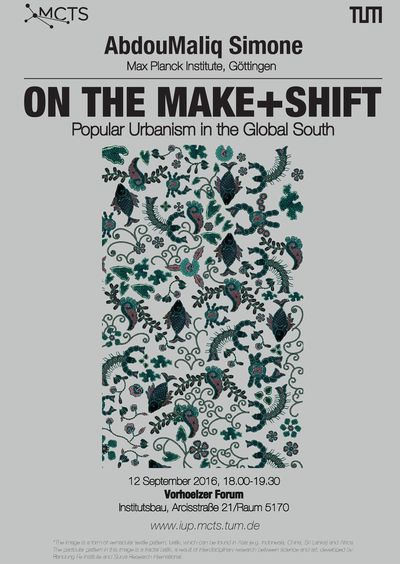ON THE MAKE+SHIFT: Popular Urbanism in the Global South
AbdouMaliq Simone (Max Planck)

The enormous transformations of the built environment and the enhanced possibilities of consumption that have marked even the most marginal of the world’s cities should not detract from acknowledging just how dependent the majority of the urban residents in the so-called “South” are on constantly putting together some workable form of income and inhabitation. The makeshift character of much of what this majority does is quite literally “make”+ “shift”. Whatever they come up with rarely is firmly institutionalized into a fixed set of practices, locales or organizational forms. This doesn’t mean that relationships and economic activities do not endure, that people do not find themselves rooted in the same place and set of affiliations over a long period of time. Rather, these stabilities inhere from a constant recalibration of edges, boundaries, and interfaces. Whatever appears to be stable largely depends upon its participation is a series of changing relationships with other activities, personnel, and sites. Whatever is made then shifts in terms of its availability to specific uses and users, as well as its exposure to new potentials and vulnerabilities. At the same time, in order for any “make+shift” to work, it has to embody generosity, reciprocity, a sense of openness and experimentation in order to keep affective energies, information and cooperation flowing. Spaces of such experimentation often require intricate deals, accommodations and dissimulation. As Ravi Sundaram has pointed out, the large-scale popular appropriation of various tools of social media has both responded to and accelerated the dissipation of postcolonial compacts. Instead of adhering to particular regimes of moral conduct and verification, urban inhabitants are producing their own scenarios, evidence, and realities through the widespread dissemination of images, texts, and tweets, aggregated in various forms and targeted for specific purposes and audiences. As such there is a substantial shift in the operations of the make+shift as it also finds new modalities and venues for circulation. They key question is how these new conjunctions between long-honed popular, relational economies and technological innovation can reshape urban spaces and life in ways that curtail exclusion and segregation, and maximize the capacities of inhabitants of all backgrounds.
Monday 12 September 2016 18:00 - 19:30
Location: Vorhoelzer Forum, Arcisstraße 21, 80333 Munich